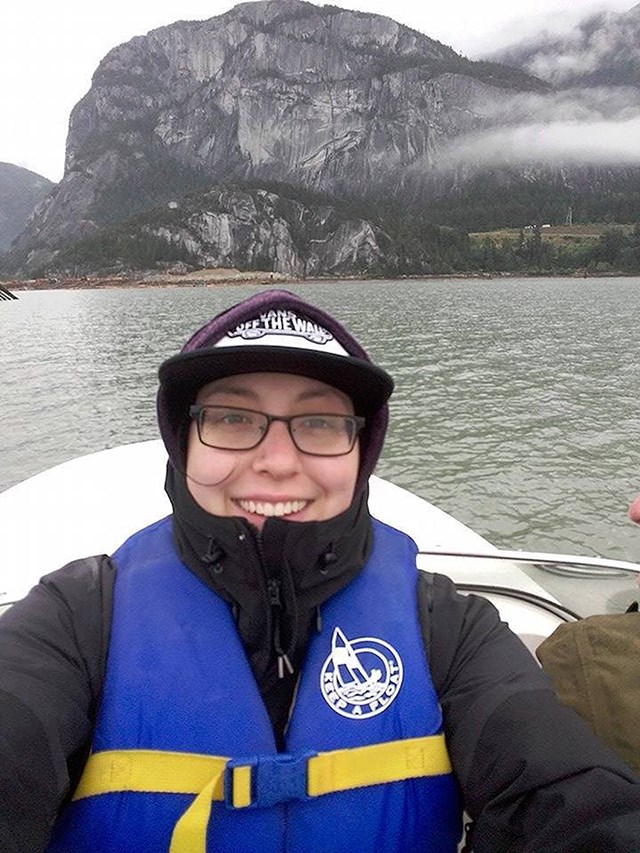Squamish’s Cheyenne Smith, a 2012 Howe Sound Secondary grad, is making waves in her new hometown, Victoria.��
Smith graduates this month with an undergraduate degree in anthropology from the University of Victoria, and is already moving forward on her masters’ degree, with an ultimate goal of positively impacting Indigenous healthcare and healthcare policy.��
The Chief caught up with Smith for a chat about her interest in reconciliation through healthcare, her studies and what is next.��
What follows is an edited version of that conversation.��
��
Q: Because some people reading this will be unfamiliar with this topic, tell us how healthcare is a factor in reconciliation.��
A: A lot of the issues that Indigenous people face regarding their health are a direct result of colonization. When the government came in and put in place these very discriminatory laws they really negatively impacted Indigenous communities. Also, there is a giant lack of trust between First Nations communities and the government, at this point. A lot of the time Indigenous people do not necessarily like to seek healthcare because they don’t feel like their culture is going to be respected or appreciated when it comes to seeking medical services.��
Also, tuberculosis is still a big issue within Indigenous communities and a lot of that is directly related to the fact that living conditions on [some] reserves is absolutely disgusting.��
Q: Growing up in Squamish, what made you interested in this topic of study?��
A: We were surrounded by Indigenous culture, and a lot of it was directly in our school curriculum, which was great. But, I didn’t really learn the colonial history until I got to university. I guess you could say I had rose-coloured glasses about it, essentially.��
And so when I came to university and started to learn about Canada’s colonial past and the residential school system, that is what sparked my interest in Indigenous healthcare. Being from Squamish, which is an Indigenous community, it hit close to home. I felt I hadn’t really done my part to be more educated on the topic.��
Q: Are you First Nations?��
A: No, but I do have Cree in my background.��
Q: Have you gotten any feedback about being non-Native and doing this type of study and work?��
A: No. I think the best word to describe myself in this context is as an Indigenous ally. Being an ally means recognizing your privileges and expressing solidarity with groups that are marginalized or oppressed.��It’s a term that is being used more frequently when referring to non-Indigenous individuals working with Indigenous communities. I feel that this accurately represents what I’m trying to do, and what everyone should be striving to do as well. ��
Q: You have spent a lot of time studying HIV rates among First Nations and note that Indigenous people in Canada are 2.7 times more likely to contract HIV than non-Indigenous populations.��
What have you learned about why rates are higher and what should be done about it?��
A: A couple of the things I focused on with my honours thesis was the lack of sexual education within Indigenous communities and the lack of education in general. When you have people coming down from rural First Nations communities to the big city, they don’t really have some of the knowledge around safe sex and what is high-risk behaviour. Also, with injection drug use that is associated with HIV, and that drug use is associated with the colonial history of First Nations.��
I really think that Canada needs to put in place more targeted prevention campaigns and initiatives for Indigenous communities.��
In Australia, which also has a large First Nations population and a colonial history, they have a lot of specifically targeted campaigns, whereas it still seems very much taboo in Canada. When writing policy, too, Canada needs to address this issue more directly.��
Q: You were part of the repatriation of the ancestral remains to the Esquimalt and Songhees Nations. Can you tell us about that?��
A: The anthropology department at UVIC had been collecting artifacts from different archaeological digs or from donations on Vancouver Island. What ended up happening was they were using one of these sample collections in a class for analysis. Some of the students recognized that there were human remains in the sample. In the end, 28 sets of human remains were found and repatriated back to the Songhees and Esquimalt Nations. We had a big ceremony and a traditional funeral with the Nations. It was very interesting and I felt really lucky to be a part of it.��
Q: What was it like personally to go through that event? How did it feel?��
A: It was extremely emotional. It didn’t really hit you until you physically see the boxes they made for the remains. I think it encouraged the Nations to know that an institution, like the university, is willing to go about doing this repatriation, in a positive way.��
Q: What is next for you?
A: I am currently doing my masters with the UVIC school of Public Health & Social Policy.��




